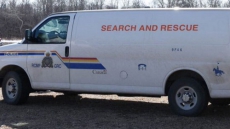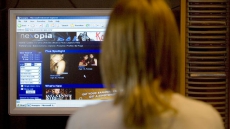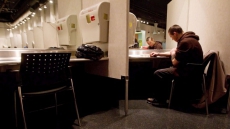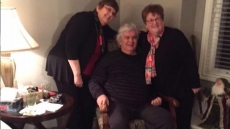TORONTO — While their classmates head home for the holidays, a handful of university students from Toronto will be spending much of their winter break in villages in India and Egypt, teaching locals how to build and sell affordable water filters.
The goal of the two small teams from Ryerson University is to help improve access to clean water while also providing local residents with an entrepreneurial education that can kickstart individual businesses.
"What makes the holidays special for me is the act of giving...The most essential thing that I could give is something that I think should be a human right, the gift of water," said Samarth Arabastani, a third-year electrical engineering student who is leading the project heading to India.
"Although I'm not going to be at home with my family, I will be giving to so many people and I think that's what the holidays are essentially about."
The two student initiatives — Project Saaf and Project Myaah — are part of the Ryerson chapter of a non-profit organization known as Enactus, which aims to use entrepreneurial action to transform lives.
The idea for Project Saaf grew out an innovation challenge held at Ryerson last November, where teams were challenged to provide a sustainable solution to a social problem in India.
"That really connected with me because I was born in India and I moved here about eight years ago," said Arabastani, 20. "We created Project Saaf to tackle water sanitation."
Four of the project's six team members are travelling to the state of Gujarat in western India later this month to spend about two weeks running workshops that will teach financial literacy skills, banking basics and the essentials of water sanitation.

The team will then select a number of potters for specialized training on building and selling a water filtration device from local materials, Arabastani said, noting that those individuals will be given micro-loans to get started.
About a month ago, however, the project had to update its workshops to include an increased emphasis on financial and banking education.
That came after India's prime minister abruptly scrapped the country's highest-denomination currency notes — which made up the majority of cash in circulation — to combat corruption, money laundering, tax evasion and counterfeiting.
The situation has hit rural villagers particularly hard in a country where the majority of transactions are conducted in cash, Arabastani said, noting that many don't have bank accounts, keeping their money at home instead.
"We really had to pivot because of the demonetization issue," said Arabastani. "We wanted to educate them on the banking system in general and also provide them entrepreneurship education that would allow them to create their own business plan."
The trip to India is particularly significant for team member Kanan Shah, who is from the region the project will be working in and immigrated to Canada last year.
"Even though I'm from the same place that we're going to go I had the privileges that others did not," said the 20-year-old entrepreneurship student. "If I get to come here and get such a good education and it's in my capability to help them in any way I can, with something as simple as pure drinking water or basic financial education, then giving up holidays is a small thing."
The project has partnered with a solar energy startup company in India that has helped the students connect with village leaders, advertise their workshops and deal with logistics on the ground.
After watching Project Saaf being planned, another Ryerson student, Omar El Araby, was inspired to start a similar project to help communities in south western Egypt.
"The ultimate goal for Project Myaah is to employ the unemployed by giving the solution of the ceramic water filter," said the fourth-year entrepreneurship student who is fluent in Arabic.
El Araby and a team member are travelling to five villages and will be working with a local organization to run workshops in the coming days.
"We're going to teach them how to create the water filter, we're going to create workshops to teach them about business entrepreneurship and financial literacy," said El Araby. "From there the potters will take and create the water filter and will sell it to their communities."
For El Araby, who is from Cairo, the project is a way of giving back.
"I came here as an international student ... I was here to get a better education and use this better education to help my country. This is where my passion come from," he said. "We are willing to give up our holiday and giving up our family time just to go there and change people's lives."





